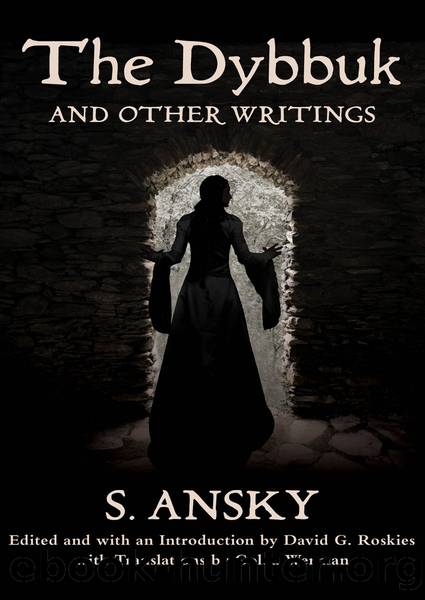Dybbuk and Other Writings by S. Ansky

Author:S. Ansky [Ansky, S.]
Language: eng
Format: epub
ISBN: 978-1-4804-4079-1
Publisher: Yale University Press
Published: 2013-09-17T19:43:00+00:00
4
On the next Sabbath I went to the big synagogue in time for afternoon prayers so that I could see for myself the war of Gog and Magog as played out by the Jewish “Turks” and “Russians.” It was dusk. All the contours were blurred, and the shadows of evening playing on the high walls of the synagogue created an eerie picture. The sight of several hundred men waving back and forth as they silently recited the eighteen benedictions made me think of a forest of trees stirring in the wind. And the spell of their muted, mystical chanting brought back memories from my own distant childhood.
I recalled the old synagogue of my youth in the shtetl where I was born and that special time on Sabbath between the afternoon and evening prayers. The old men would walk slowly back and forth in the little synagogue, their hands behind their backs, dreamily humming a tune while they waited for darkness so they could recite the evening prayers. When they got tired of walking, they sat on the benches and, still in a state of reverie, would tell each other stories. Someone would begin with a hasidic legend, another would relate some interesting event in his life—and everything became bewitched and full of mystery in that shadowy twilight hour of early evening. The men listened, spellbound, and remained in their seats long after the stories were finished, so as not to interrupt the magical stillness.
At that hour the world of everyday cares was forgotten—everyone was pensive, lost in his own musing. Someone invariably began to sing a well-known melody, “Bim, bam, bom,” and soon everyone would chime in, each adding his own dreamy tune. Then someone would suddenly jump up, as if awakened from a sleep and say pleadingly, “Zerach, begin!”
And Zerach always complied. From his seat, he would quietly begin to hum the traditional Rosh Hashanah and Yom Kippur melodies, and as one congregant after another joined in, the singing became louder and louder. The echoes of the infinitely sad High Holiday melodies would ring through the little old synagogue for a long time.
The singing continued even after the sky was filled with stars and the synagogue was dark. No one wanted to begin the evening prayers which usher out the Sabbath; no one was in a hurry to go back to the prosaic cares of the everyday world.
It was a golden hour for the children, too, for they were touched by the same special mood that overtook the grown-ups. Some youngsters would stay close to their fathers to listen to the tales the men told. Others formed little circles at various points in the synagogue and told each other ghost stories. The livelier ones found the darkness a good cover for their pranks and games of hide-and-seek; some even threw “bombs” made of twisted towels at the beadle or the congregants. No matter! At this magical hour childish tricks like these went unpunished. “They’re only children; let them have fun” was the sentiment.
Download
This site does not store any files on its server. We only index and link to content provided by other sites. Please contact the content providers to delete copyright contents if any and email us, we'll remove relevant links or contents immediately.
| African | Asian |
| Australian & Oceanian | Canadian |
| Caribbean & Latin American | European |
| Jewish | Middle Eastern |
| Russian | United States |
4 3 2 1: A Novel by Paul Auster(11048)
The handmaid's tale by Margaret Atwood(6852)
Giovanni's Room by James Baldwin(5878)
Big Magic: Creative Living Beyond Fear by Elizabeth Gilbert(4723)
Asking the Right Questions: A Guide to Critical Thinking by M. Neil Browne & Stuart M. Keeley(4574)
On Writing A Memoir of the Craft by Stephen King(4213)
Ego Is the Enemy by Ryan Holiday(3991)
Ken Follett - World without end by Ken Follett(3972)
The Body: A Guide for Occupants by Bill Bryson(3800)
Bluets by Maggie Nelson(3710)
Adulting by Kelly Williams Brown(3670)
Guilty Pleasures by Laurell K Hamilton(3586)
Eat That Frog! by Brian Tracy(3514)
White Noise - A Novel by Don DeLillo(3434)
The Poetry of Pablo Neruda by Pablo Neruda(3367)
Alive: The Story of the Andes Survivors by Piers Paul Read(3310)
The Bookshop by Penelope Fitzgerald(3225)
The Book of Joy by Dalai Lama(3217)
Fingerprints of the Gods by Graham Hancock(3212)
